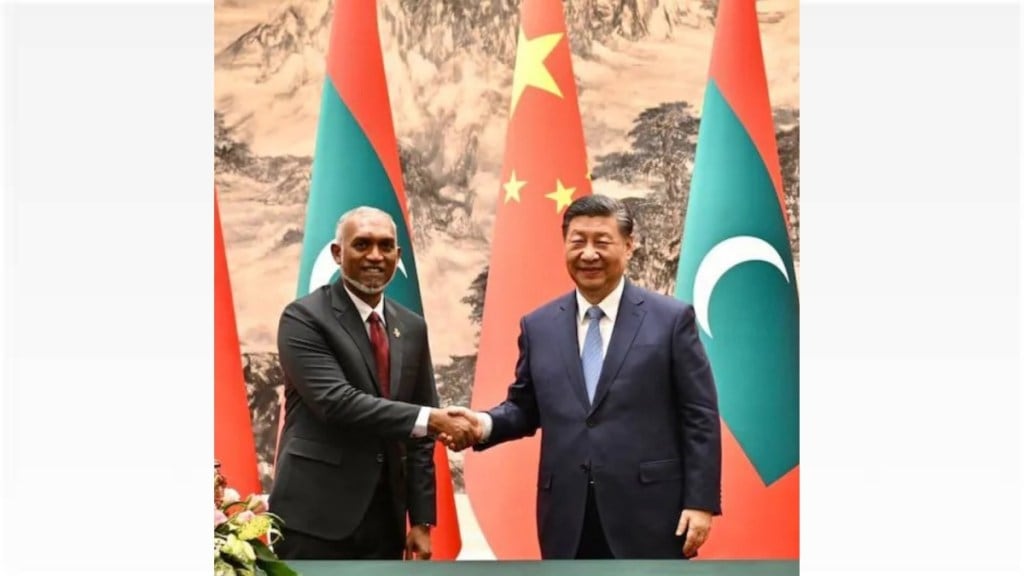In the current situation of diplomatic tensions with India, the Maldives receives substantial military assistance from China. This strategic move comes in the wake of a formal defence cooperation agreement signed between Male and Beijing, signalling a paradigm shift in the Maldives’ foreign policy calculus.
President Mohamed Muizzu’s recent call for the withdrawal of Indian military personnel from the Maldives has further strained relations between Male and New Delhi, underscoring the complexities of regional power dynamics.
Amidst heightened scrutiny of its diplomatic alignments, the Maldives seeks to deepen defence ties with China, as evidenced by Defence Minister Mohamed Ghassan Maumoon’s recent meeting with Major General Zhang Baoqun of China’s Office for International Military Cooperation.
First Team of Technical Personnel Reaches Male
“The first team of technical personnel to operate the advanced light helicopter has reached the Maldives. It will replace the existing personnel who were operating this platform,” affirmed Ministry of External Affairs spokesperson Randhir Jaiswal in a recent media briefing.
Maldives & China
The agreement, inked between Maumoon and Major General Baoqun, not only underscores China’s commitment to providing military assistance but also reflects a broader ambition to foster stronger bilateral relations with the Maldives. Additionally, China’s gesture of goodwill extends beyond military support, with the donation of 12 eco-friendly ambulances symbolizing Beijing’s multifaceted engagement with Male.
This strategic manoeuvre by the Maldives coincides with India’s deployment of civilian technical experts to replace military personnel operating crucial assets in the country. President Muizzu’s directive for the withdrawal of Indian troops by March 10 signals a recalibration of traditional alliances and a pivot towards alternative strategic partnerships.
India is not a Bully
“The big change today in this part of the world is what has happened between India and its neighbours. When you say India is perceived as a big bully, you know, big bullies don’t provide $4.5 billion when the neighbours are in trouble. Big bullies don’t supply vaccines to other countries when Covid-19 is on or make exceptions to their own rules to respond to food demands or fuel demands or fertiliser demands because some war in some other part of the world has complicated their lives,” remarked External Affairs Minister S Jaishankar during a recent event in New Delhi.
Strained India – Maldives Relations
The strained diplomatic relations between India and the Maldives trace back to President Muizzu’s assumption of power in November 2023. Viewed as a pro-China leader, Muizzu’s administration has signalled a departure from previous alignments, raising concerns in New Delhi over its influence in the Indian Ocean region.
Jaishankar’s recent remarks underscore India’s concerns over perceived bullying tactics by its neighbours, highlighting the complexities of the current diplomatic landscape and the need for nuanced engagement.
India has always extended a helping hand
Despite the diplomatic friction, India’s historical ties with the Maldives remain significant, with New Delhi’s swift intervention during the 1988 coup attempt and subsequent financial assistance packages reaffirming its commitment to Male’s sovereignty and security.
The ties between India and Maldives have remained strained ever since Muizzu came into power in November 2023
Prime Minister Narendra Modi’s engagement with former Maldivian President Ibrahim Solih further exemplifies India’s commitment to the Maldives’ development. The financial assistance package and infrastructure projects announced during Solih’s visit underscore India’s role as a reliable partner in the region.
Defence and security cooperation have been cornerstone elements of India-Maldives relations, with India playing a pivotal role in training the Maldivian National Defence Force (MNDF). Over the past decade, India’s support has been instrumental in enhancing the MNDF’s capabilities, contributing to joint patrols and disaster relief efforts.
While these incidents have been reduced due to the promptness of the Indian Navy, the threats cannot be ignored
While India remains a key partner for the Maldives, China’s increasing presence in the region offers alternative avenues for strategic collaboration. Beijing’s military assistance and broader economic engagement present Male with an opportunity to diversify its partnerships and reduce dependence on traditional allies.
As the geopolitical dynamics in the Indian Ocean region continue to evolve, the Maldives navigates diplomatic waters, seeking to leverage strategic partnerships to secure its national interests and promote regional stability. With China’s growing influence and India’s historical ties, the Maldives finds itself at the intersection of competing interests, requiring nuanced diplomacy to safeguard its sovereignty and advance its development agenda.
The ongoing construction has created 7,000 direct and 20,000 indirect jobs
Amidst these dynamics, the Maldives charts new courses, pursuing a balanced foreign policy approach that balances strategic imperatives with economic interests, thereby shaping the contours of the Indo-Pacific region’s evolving geopolitical landscape.

